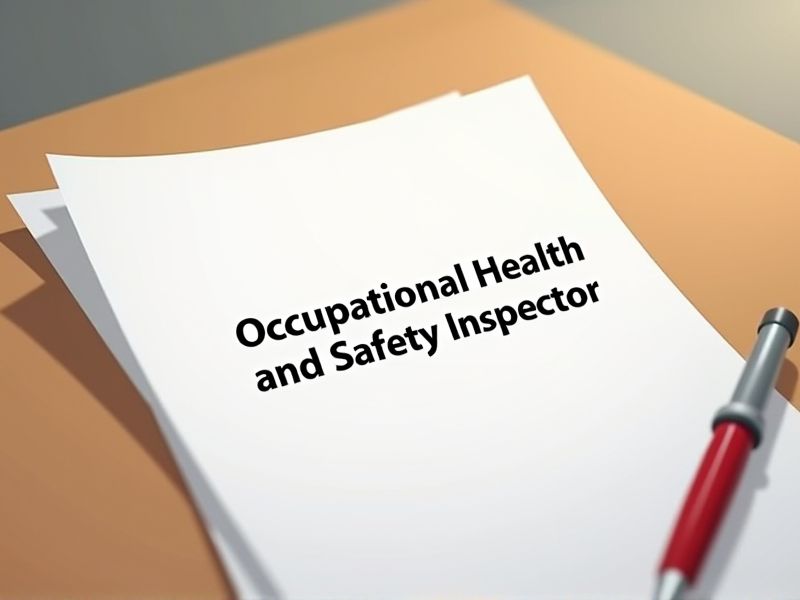
Occupational health and safety inspectors play a crucial role in ensuring workplace environments comply with safety regulations, preventing hazards and minimizing accidents. The intricate nature of various industries necessitates certain certifications to equip inspectors with specialized knowledge and skills. These certifications verify an inspector's competence in identifying potential risks and implementing appropriate safety measures. Essential certifications for an Occupational Health and Safety Inspector include the following.
Certified Safety Professional (CSP)
The Certified Safety Professional (CSP) credential enhances an inspector's credibility, demonstrating advanced knowledge and experience in safety practices. Possessing a CSP can result in improved workplace safety because inspectors are better equipped to identify and mitigate hazards. Employers often require or prefer CSP certification to ensure compliance with industry standards and regulations. Inspectors with a CSP can potentially reduce workplace incidents and liabilities, benefiting both employees and organizations.
Certified Industrial Hygienist (CIH)
Industrial environments often contain hazardous substances, and a Certified Industrial Hygienist (CIH) applies specialized knowledge to identify and evaluate these risks. CIHs have expertise in developing and implementing control measures, which reduces the incidence of workplace-related illnesses and injuries. Occupational Health and Safety Inspectors benefit from CIH input because it ensures compliance with regulations and industry standards. CIHs often stay updated on emerging health threats, aiding Inspectors in adapting safety protocols accordingly.
Occupational Health and Safety Technologist (OHST)
Occupational Health and Safety Technologists bring specific technical expertise that enhances the effectiveness of health and safety inspections. Their specialized knowledge assists inspectors in analyzing complex data and identifying potential hazards more accurately. By collaborating with OHST professionals, inspectors gain insights into advanced safety technologies and methods, leading to improved workplace safety outcomes. The inclusion of OHST expertise can lead to more informed decision-making processes during inspections, ultimately reducing workplace incidents and compliance issues.
NEBOSH International General Certificate in Occupational Health and Safety
Possessing the NEBOSH International General Certificate in Occupational Health and Safety typically ensures a solid foundational understanding of risk management and hazard control, essential for analysis and decision-making in inspection roles. This qualification often demonstrates a commitment to best practices, which can enhance credibility and authority when enforcing health and safety regulations. NEBOSH certification usually covers a wide array of topics, from health and safety management systems to international standards, equipping inspectors with the necessary knowledge to operate in diverse environments. Employers may frequently require this certification as it generally ensures inspectors are competent in evaluating workplace safety conditions and implementing improvement strategies.
Construction Health and Safety Technician (CHST)
The Construction Health and Safety Technician (CHST) provides specialized expertise and understanding of construction site-specific hazards, which informs the Occupational Health and Safety Inspector's assessments. Their knowledge aids in identifying potential risks and implementing effective control measures, thus enhancing overall site safety. Collaboration between CHSTs and inspectors ensures compliance with safety regulations, reducing the likelihood of accidents and associated costs. This synergy leads to improved safety culture, fostering a proactive approach to health and safety in construction environments.
Associate Safety Professional (ASP)
An Associate Safety Professional (ASP) credential equips Occupational Health and Safety Inspectors with a standardized level of expertise, demonstrating their ability to identify and mitigate workplace hazards. This accreditation validates an inspector's knowledge in critical safety principles, thereby enhancing their capability to implement effective safety protocols. Possessing an ASP credential often opens opportunities for inspectors to work across diverse industries where expert safety management is essential. Employers seeking to maintain compliance with safety regulations tend to prioritize hiring inspectors with ASP accreditation, as it indicates a commitment to maintaining high safety standards.
Certified Safety & Health Manager (CSHM)
The presence of a Certified Safety & Health Manager (CSHM) ensures a comprehensive understanding of regulatory compliance, reducing the risk of workplace violations. Their expertise in hazard identification and risk assessment directly lowers the likelihood of workplace accidents and injuries. By optimizing safety protocols, they contribute to increased organizational efficiency and reduced liability costs. Their role in promoting a culture of safety enhances employee morale and trust, aligning with organizational goals for a safe working environment.
OSHA 30-Hour Training Certification
Earning an OSHA 30-Hour Training Certification equips Occupational Health and Safety Inspectors with a comprehensive understanding of workplace safety standards and regulations, which is crucial for enforcing compliance. This certification enhances their ability to identify and mitigate potential hazards, thus reducing workplace accidents and health risks. It also strengthens an inspector's credibility and effectiveness in communicating safety protocols to both employers and employees. Employers prioritize inspectors with this certification, as it demonstrates a thorough grasp of critical safety practices and procedures.
Certified Hazardous Materials Manager (CHMM)
The CHMM provides specialized knowledge in hazardous materials management, which enhances the inspector's ability to identify potential risks at workplaces. Certification equips inspectors with the skills necessary to develop and implement safety protocols, ensuring compliance with health regulations. Expertise in hazardous materials management is essential for risk assessment and mitigation strategies, preventing workplace accidents. Familiarity with legal and environmental requirements ensures regulatory adherence, reducing liability and safeguarding employee well-being.
CPR/First Aid Certification
CPR/First Aid Certification equips Occupational Health and Safety Inspectors with critical skills to respond immediately to workplace emergencies. Often, they are the first to identify and address potential hazards, making real-time intervention and prevention of fatalities possible. Employers rely on their expertise to ensure compliance with safety standards, and certified inspectors can better uphold these standards effectively. Having this certification increases the inspector's credibility and competency, fostering trust and assurance among employees and organizations.
Summary
When you obtain certifications as an Occupational Health and Safety Inspector, you likely enhance your expertise and credibility in the field. This can lead to increased trust from employers and employees, positively impacting workplace safety adherence. Enhanced qualifications might also open up more career opportunities and potentially result in salary advancements. Certification can directly influence your ability to identify and mitigate workplace hazards effectively.
